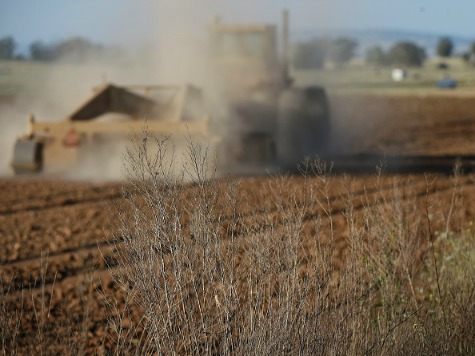LOS ANGELES – On Thursday, the House passed Republican-backed legislation that would ensure California farmers adequate water supply to combat the state’s record four-year drought, despite a veto threat from the White House.
The House passed the Western Water and American Food Security Act of 2015 (HR 2898) by a vote of 245-176. Just five Democrats joined Republicans in voting for the bill.
The legislation would set a minimum amount of water that the state must allow to flow through the Central Valley Project (CVP), one of several key water infrastructure systems that provides water to most of California’s farmers. Federal officials would be required to prove that a fish species would go extinct to reduce the amount of water pumped through the CVP. The bill would also speed up the environmental review process for the construction of new water storage projects, like dams and reservoirs.
The bill was authored by Rep. David Valadao (R-Bakersfield) and co-sponsored by 25 other House members from 11 states.
Despite its passage, the bill faces a veto threat from President Obama and, before then, a tough test in the Senate, where it could be shot down by Democrat senators under heavy pressure from environmental groups.
Valadao called his bill a “balanced approach” and lashed out at the White House following its veto threat:
It has become clear that this Administration is out of touch with reality – a reality that hundreds of thousands of my constituents are faced with each and every day. Californians continue to suffer from extreme drought conditions and families across the country are facing steep prices at the grocery store. Despite this, the White House continues to prioritize an extreme environmental agenda that places the needs of fish over the needs of people.
House Speaker John Boehner called the veto threat a demonstration of “this administration’s inflexibility, close-mindedness, and desire to please its liberal allies.”
“I urge the Senate to send a message to the president by acting swiftly on this bill,” Boehner added.
But Democrats remain strongly opposed to the measure. They argue that Republicans have not included safeguards to protect California’s drought-ravaged ecosystems and fishing industries, and that the legislation in its current form would have unintended consequences.
“If that fresh water doesn’t run through and run out to the ocean, the salt water runs back in,” Rep. Mike Thompson (D-St. Helena) told the Associated Press. “I have two major cities in my district that rely on that for a source of water. If this bill were to pass, their water supply is in jeopardy. You can’t drink salt water. It just doesn’t work.”
Arizona Rep. Raúl Grijalva (D) called the bill a “major disappointment to me, to the people of California, and to the ninety percent of Americans who think the Endangered Species Act is worth preserving.”
“Despite their professed love for our public resources, some of my Republican colleagues just can’t seem to find a species worth saving or habitat worth protecting,” Grijalva also stated.
Meanwhile, the nonprofit California Water Alliance (CalWA) cheered the bill’s passage and slammed the Obama administration’s “obstruction.”
“Threats of a veto do nothing for food producers with dying apple orchards in Washington,” said CalWA executive director Aubrey Bettencourt. He elaborated:
They do nothing for those who would start preparing for future droughts and floods by building new surface water storage in Oregon, Wyoming, or my state of California. It provides no relief for Arizona, Utah, Colorado, Nevada or New Mexico as they watch their Colorado River reservoirs dwindle and decline. It doesn’t stop future wildfires that will rage from the Southwest to Alaska.
“It’s time to start getting this right,” Bettencourt added, calling Valadao’s bill “the nation’s – and California’s – best shot this term.”

COMMENTS
Please let us know if you're having issues with commenting.